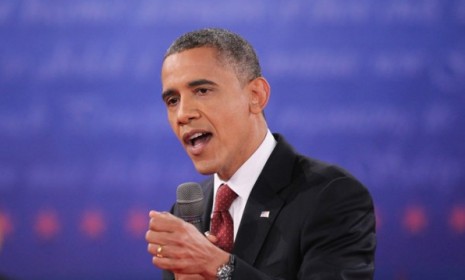Obama's improved debate performance: 4 key factors
President Obama bounced back from his loss to Mitt Romney in the first debate. How did he do it?

A free daily email with the biggest news stories of the day – and the best features from TheWeek.com
You are now subscribed
Your newsletter sign-up was successful
Instant polls gave President Obama the win in Tuesday's debate, with 37 percent of uncommitted voters polled by CBS News giving him the victory compared with 30 percent siding with Romney. A CNN survey gave Obama a 7-percentage-point edge among registered voters. Seventy-three percent told CNN that Obama had done better than they expected. That's hardly a surprise after Obama's lackluster first debate on Oct. 3, which, along with Romney's confident and authoritative performance, cost the president his lead in the polls. With the stakes raised for the second of their three encounters, Obama practiced harder this time. How did he manage to come across so much better? Here, four theories:
1. Obama took charge
The president "concluded that he was 'too polite' in his first debate" with Romney, says Peter Baker at The New York Times, but he "made sure no one would say that after their second. He interrupted, he scolded, he filibustered, he shook his head." Time and again, he forcefully smacked down assertions Romney had made with lines like, "What Governor Romney said just isn't true." Coming off a performance when he "took presidential decorum to a Xanax extreme," Obama was "teetering on the edge" of a one-term presidency. "Making a more forceful case" on Tuesday was an absolute must, and Obama delivered.
The Week
Escape your echo chamber. Get the facts behind the news, plus analysis from multiple perspectives.

Sign up for The Week's Free Newsletters
From our morning news briefing to a weekly Good News Newsletter, get the best of The Week delivered directly to your inbox.
From our morning news briefing to a weekly Good News Newsletter, get the best of The Week delivered directly to your inbox.
2. The president played offense and defense
For most of the evening's questions, Obama "had two answers: the one about him, and the one about Mitt Romney," says Glen Johnson at The Boston Globe. After his Oct. 3 drubbing, Obama had to both undercut Romney's building support by ripping apart the GOP challenger's assertions, while defending his record and "allaying concerns about his own commitment within his own political base." By making his answers do "double duty," Obama was able to go on the offense and play defense at the same time.
3. He was aggressive and bent the truth
"Obama, as I fully expected, did not repeat his lethargic, distracted performance of the last debate," says James Joyner at Outside the Beltway. "If anything, he overcompensated by coming across as a little too aggressive." Much of the rest was smoke and mirrors. "Obama deftly didn't answer the Libya question, but simultaneously appeared to be taking full responsibility for everything bad that happened while not admitting any fault whatsoever." On immigration, "Obama was simply dishonest in suggesting that Romney was a full-throated supporter" of Arizona's controversial crackdown on illegal immigrants.
A free daily email with the biggest news stories of the day – and the best features from TheWeek.com
4. Obama had nowhere to go but up
There's no question Obama "was better than the impossibly lame president who showed up in Denver two weeks ago," says John Hinderaker at Power Line, "but that is a low standard." The flip side, however, is that Romney did well, too, and he particularly "clobbered the president" on his failed record over the last four years. To "reverse his decline" in the polls, Obama needed a real knockout, and, with Romney matching him every step of the way, he didn't get it. "A draw won't get Obama re-elected."
Read more political coverage at The Week's 2012 Election Center.